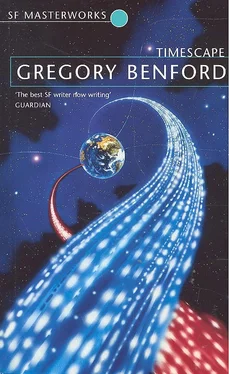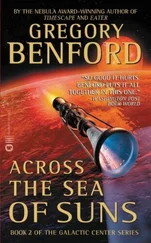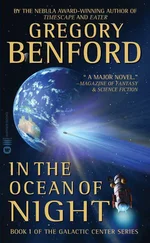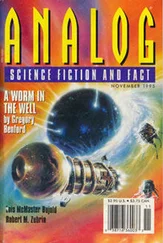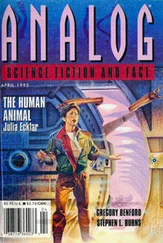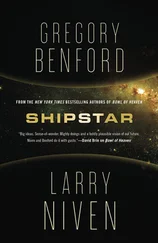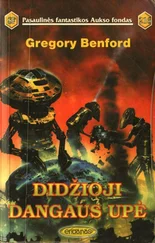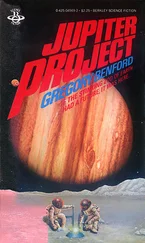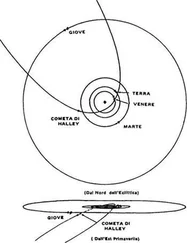“Do you believe your… re… results?” she asked.
Gordon hesitated. Under her penetrating gaze he felt himself beneath the microscope of history; this woman had come out of Poland, passed through the war years, worked on the separation of uranium isotopes for the Manhattan Project at Columbia, done research with Fermi just before cancer caught him. She had come through all that and more: her husband, Joe, was a brilliant chemist and held a full professorship at Chicago, while she was denied a faculty position and had to be content with a research associate position. He wondered suddenly if she had been irritated at that while she did the work on the shell model of the nucleus that made her famous. Compared to what she faced, his troubles were nothing. He bit his lip.
“Yes. Yes, I think so. Something… something is trying to reach us. I don’t know what.”
She nodded. There was a serene confidence in the way she did it, despite her numbed side, that clutched at something in Gordon. He blinked in sunset’s lancing light, and the glow turned to warm water in his eyes. “Good. Good,” she murmured with a halting tongue, and moved away, still smiling at him.
• • •
He arrived home just after Penny, and found her changing clothes. He dumped his briefcase, carrying the cares of the day, into a corner. “Where to?” he asked.
“Surf’s up.”
“Christ, it’s getting dark.”
“Waves don’t know that.”
He sagged against the wall. Her energy staggered him. This was the facet of California he found hardest: the sheer physicality of it, the momentum.
“Come with me,” she said, pulling on a French bikini brief and a T-shirt. “I’ll show you how. You can body surf.”
“Uh,” he said, not wanting to mention that he had looked forward to a glass of white wine and the evening news. After all, he thought—and suddenly not quite liking the thought—there might be a followup on the Shriffer story.
“Come on!”
• • •
At Windansea Beach he watched her carve a path down the slope of a descending wave and wondered at it: a frail girl, mastering a blunt board and harnessing the blind momentum of the ocean, suspended in air as though by some miracle of Newtonian dynamics. It seemed a liquid mystery, and yet he felt he should be unsurprised; it was, after all, classical dynamics. The gang from around the pump house was out in full force, riding their boards as they awaited the perfect oncoming toppling ton of water, brown bodies deft on the white boards. Gordon sweated through the remorseless routine of the Royal Canadian Air Force exercises, assuring himself that this was just as good as the obvious pleasure the surfers took in their splitting of the waves. The required situps and pushups done, he ran over the swaths of sand, puffing to himself and in a muzzy way trying to unscramble the events of the day. They refused his simple tug: the day would not break down into simple paradigm. He halted, gasping in the salt air, eyebrows dark and beaded with sweat. Penny walked forward on her board, perched in the thick air, and waved to him. Behind her the ocean cupped itself upright and caught her board in a smooth hand, tilting it forward. She teetered, wobbled, arms fanned the air: she fell. The soapy churn engulfed her. The slick white board tumbled forward, end over end, driven by momentum’s grasp. Penny’s head appeared, hair plastered like a cap to her head, blinking, teeth white and bared. She laughed.
• • •
As they dressed he said, “What’s for supper?”
“Whatever you want.”
“Artichoke salad, then pheasant, then a brandy trifle.”
“I hope you can make all that.”
“Okay, what do you want?”
“I’m going out. I’m not hungry.”
“Huh?” A dull dawning of surprise. He was hungry.
“I’m going to a meeting.”
“What for?”
“A meeting. A rally, I guess.”
“For what?” he persisted.
“For Goldwater.”
“What?”
“You may have heard of him. He’s running for President.”
“You’re kidding.” He stopped, foot in midair, halfway into his jockey shorts. Then, realizing how comical he must look, he stepped in and pulled them up. “He’s a simple-minded—”
“Babbitt?”
No, Sinclair Lewis wouldn’t have occurred to him. “Just leave it at simple-minded.”
“Ever read The Conscience of a Conservative? He has a lot of things to say in there.”
“No, I didn’t. But look, when you have Kennedy, with the test ban treaty and some really new ideas in foreign policy, the Alliance for Progress—”
“Plus the Bay of Pigs, the Berlin Wall, that pig-eyed little brother of his—”
“Oh, come on. Goldwater is just a pawn of big business.”
“He’ll stand up to the communists.”
Gordon sat down on their bed. “You don’t believe that stuff, do you?”
Penny wrinkled her nose, a gesture Gordon knew meant her mind was set. “Who sent our men into South Vietnam? What about what happened to Cliff and Bernie?”
“If Goldwater gets in there’ll be a million Cliffs and Bernies over there.”
“Goldwater will win over there, not just fool around.”
“Penny, the thing to do over there is cut our losses . Why support a dictator like Diem?”
“All I know is, friends of mine are getting killed.”
“And Big Barry will change all that.”
“Sure. I think he’s solid. He’ll stop socialism in our country.”
Gordon lay back on the bed, spouting a resigned whoosh of disbelief. “Penny, I know you think I’m some sort of New York communist, but I fail to see—”
“I’m late already. Linda invited me to this cocktail party for Goldwater, and I’m going. You want to go?”
“Good God, no.”
“Okay, I’m going.”
“You’re a literature student who’s for Goldwater? Come on”
“I know I don’t fit your stereotypes, but that’s your problem, Gordon.”
“Jeezus.”
“I’ll be back in a few hours.” She combed back her hair and checked her pleated skirt and walked out of the bedroom, stiff and energetic. Gordon lay on the bed watching her leave, unable to tell whether she was serious or not. She slammed the front door so hard it rattled, and he decided that she was.
• • •
It was an unlikely match from the start. They had met at a wine and chips party in a beach cottage on Prospect Street, a hundred yards from the La Jolla Art Museum. (The first time Gordon went to the Museum he hadn’t noticed the sign and assumed it was simply another gallery, somewhat better than most; to call it and the Met both museums seemed a deliberate joke.) His first impression was of her assembled order: neat teeth; scrupulously clear skin; effortless hair. A contrast with the thin, conflicted women of New York he had seen, “encountered”—a favorite word, then—and finally been daunted by. Penny seemed luminous and open, capable of genuinely breezy talk, uncluttered with the delivered opinions of The New York Times or the latest graduate seminar on What Is Important. In a flowered cocktail dress with a square neckline, the straight lines mitigated by a curving string of pearls, her glowing tan emitted warm yellow radiations that seeped through him in the wan light, life from a distant star. He was well into a bottle of some rotgut red by that time and probably overestimated the magic of the occasion, but she did seem to loom in the shadowed babble of the room. In better lit circumstances they might not have hit it off. This time, though, she was quick and artful and unlike any woman he had ever met before. Her flat California vowels were a relief from the congested accents of the east, and her sentences rolled out with an easy perfection he found entrancing. Here was the real thing: a naturalness, a womanly fervor, a clarity of vision. And anyway, she had ample, athletic thighs that moved under the silky dress as though her whole body were constrained by the cloth, capable of joyful escape. He didn’t know much about women—Columbia’s notorious deficiency—and as he knocked back more wine and made more conversation he wondered at himself, at her, at what was happening. It was uncomfortably like a cherished fantasy. When they left together, climbed into a Volkswagen and stuttered away from the still-buzzing party, his breath quickened at the implications—which promptly came true. From there the times spent together, the restaurants mutually enjoyed, the records and books rediscovered, seemed inevitable. This was the canonical It. The one thing he had always known about women was that there had to be magic, and now here it was, unannounced, even rather shy. He seized it.
Читать дальше
